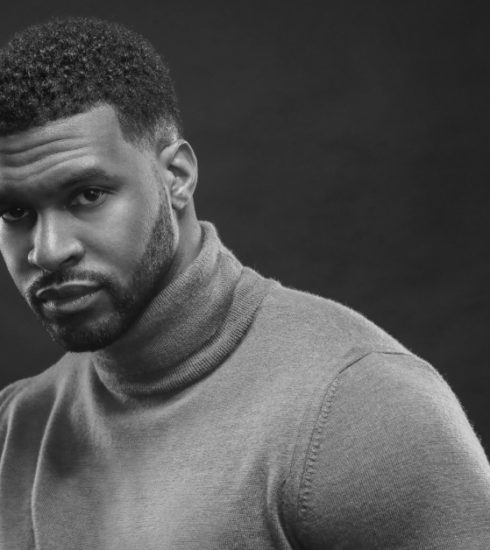Chester Tre Rogers talks about landing the role of Sterling Black on BMF and navigating acting and professional sports
Cox: Last year, when you landed the role as Sterling Black, did you think it would evolve into this?
Tre: Honestly, no! When I auditioned and got the role, I thought it would be a one-and-done situation. You know how it goes; you are in one scene or episode, and that’s it. But it turned into six months of filming as my character Sterling Black kept growing in the series. During that time, I had to turn down many teams due to the increase in my filming schedule.
Cox: So, take me to you landing the role of Sterling Black and being on BMF.
Tre: Honestly, it was just at the right place and time. My parents and I took Ian Wolf, the producer, out to eat to pitch him my resume. I didn’t think anything was going to come from it. But two weeks later, I got an email from a casting director for BMF. And I had forty-eight hours to learn everything and submit my audition. It was crazy because after submitting my audition tape, I received a callback an hour later asking when I would be able to film. And that’s how it happened.
Cox: What do you think you did in that first scene that made them say we need to expand his character and role more?
Tre: They said I was so believable and scary how I came off (laughs). It’s such a dope scene, and I’m excited that everyone will get to see it. They saw my demeanor, and they knew I was perfect for it. So they invited me to film the next episodes in Detroit for the next six weeks.
Cox: What is it about Sterling Black that you can relate? Will I see Tre acting as Sterling Black or Sterling Black being Tre?
Tre: I don’t say that’s me how aggressive Sterling is with the things he does. But I can relate to his principle about not playing with money (laughs). But, overall, it’s his loyalty that I can tell because I’m a very loyal person. That’s what you see with him and the whole BMF family. It wasn’t blood or knowing each other for years, but the loyalty they had with each other.


Cox: Why do you think people are drawn to BMF, yourself included?
Tre: It’s something many of us can relate to, especially me from the south. The stories of BMF are something we grew up hearing about. It was so surreal to hear about Big Meech, putting kids through college, getting people homes, and taking care of others outside of all the bad things you heard. The story is cultural and iconic.
Cox: Speaking of teams, you are both a professional athlete and a working actor. Has it been tough doing both?
Tre: It is very demanding doing both. It requires me to sacrifice my time and have extreme discipline. As I mentioned, I had to turn down teams while filming for six months. Then, of course, I was happy after we were done because I could return to the field. But, again, time was the most significant sacrifice for me because even when I went back to the area, there were times when we were done with practice, and I would have to head over to the studio to do voiceovers for the show. But I understood this would come with the territory, so I was never worried.
Cox: Since both industries require you to give 100% while there, did you ever get any pushback from coaches, directors, cast members, or teammates, thinking you might be splitting too much of your time?
Tre: No, I never received any of that, mainly because I pride myself as a professional. Whatever I say I’m going to do, I do and give it my all. When I’m on set, my directors and producers will complement my work ethic because I show up as a professional on time and know my lines. Same when I was on the field. My teammates didn’t even know I was going to the studio once we were done with practice. I did that so nothing could interfere with our practice and the team only sees me giving them my hundred and ten percent to what we are doing.
Cox: Speaking of Football. Tell me more about that and what you love the most about the game.
Tre: (Laughs) I picked up the ball around six. I love the competition of it all. Playing in front of seventy-plus thousand fans every Sunday and beating the guy right in front of me is why I’m still doing it. The ultimate experience still gives me butterflies whenever I run out of the tunnel onto the field. The brotherhood is another thing I love about it. I have built many relationships in the locker room that will last forever.
Cox: What is something you learned about yourself playing football all your life?
Tre: Being able to preserve. Many don’t know that I was undrafted when I got to Grambling State University (the best university, to make sure everyone knows). But you see me now, and I have lasted eight years in the game. Because of the adversities I’ve faced, and with football, you can throw anything at me, and I will preserve. This showed up later for me one time when I went on set. Something threw me, and I had to tap back into my football player mentality. I told myself okay, this happened; now get back up and don’t make this same error again.
Cox: I have seen professional athletes transitioning into acting with a particular and laser-focused mindset.
Tre: It’s because in the game, we can’t get too high, and we can’t get too low with things. Let’s say I get a touchdown. I may celebrate that for like three seconds, but then I have to switch to what’s the next play. That’s the same with acting. I might kill this scene, but I still have to stay locked in with my character. So, I use the same football tactics to keep me honed in on set and to maintain focus.


Cox: So, where did acting fit into a young Tre’s life?
Tre: It just happened to me at the age of ten. There was this open casting call that I auditioned for and landed in my hometown. From there, I kept at it and honed in on my craft.
Cox: Nice; what do you love about acting?
Tre: I love that acting allows me to be artistic and creative and express my feelings. It’s really like a therapy session for me when I’m working. I must bottle up my emotions on the field and use anger and aggression to win the game. It’s different with acting because I can let all those emotions go. It allows me to tap into other emotions and feelings that I usually don’t. For example, I might be going through something that day, and I get to release all that.
Cox: This has been fun. Before we end, I know you are very entrepreneurial; let me know a little about that.
Tre: I call myself a serial entrepreneur and a student of the game who is constantly learning. In 2020 is when I tapped into my entrepreneurship. I have a clothing line, a home health care company with my family, a trucking business, real estate, and so on. I’m working on opening a couple of lounges this year, so you all need to be on the lookout.
Photography Credit: Kayla Madonna






